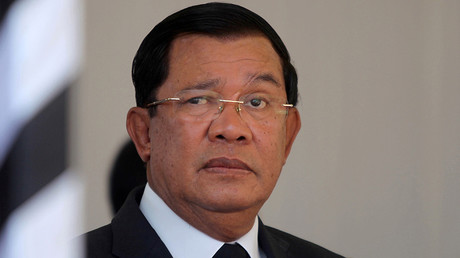Record turnout in Cambodia’s election amid claims of crackdown & US meddling (VIDEO)
Cambodia’s general election on Sunday showed an impressive turnout of more than 82 percent. The vote, which is set to return Prime Minister Hun Sen to power, was marred by allegations of US meddling and of a crackdown on critics.
With vote-counting underway, the National Election Commission (NEC) said the election saw a record turnout of 82.71%. The NEC chairman rejected media reports of bribery and intimidation of voters, saying: “You can tell from the face of the voters. They are happy. So how can you say that they were forced?”
The election in Cambodia was “so different from anywhere I’ve seen people vote,” RT’s Ilya Petrenko reported from country’s capital, Phnom Penh. The polling stations in the Southeast Asian state, populated by over 16 million, opened at 7am the morning and closed just after lunchtime, at 3pm.
Voters were asked to dip their finger into indelible ink, which not only precluded the possibility of double-voting but also made it clear who took part in the election and who didn’t. RT’s crew witnessed rather long queues at the polling station in the capital.
There’s little doubt that the majority of those who came gave their vote to the Prime Minister and head of ruling Cambodian People’s Party (CPP), Hun Sen, who has been de facto leader of the country since 1985. There were 20 parties contesting in the ballots, but CPP had no worthy opponent as the Cambodia National Rescue Party (CNRP), which claimed almost 45 percent of the ballot back in 2013, wasn’t in the running.
Dismissing the opposition’s calls for a boycott, Sen thanked the voters on his official Facebook page, saying that “compatriots have chosen the democratic path and used your rights.”
The vote took place amid accusations from the West that the election wasn’t free and fair. In turn, the Cambodian authorities said that they were trying to protect the country from foreign meddling. They said the US has been scheming in Cambodia, with sponsored NGOs and media outlets at the forefront. In order to curb those attempts, Radio Free Asia, the National Democratic Institute and other Washington-backed organizations were kicked out of the country.
“Foreign interference will not stand in Cambodian democracy,” Suos Yara, the ruling party’s spokesman, told RT. “They never stop… they want to continue their mission to topple the government.”
The CNRP leader Ken Sokha was imprisoned in September 2017 on charges of treason. Sokha didn’t hide his contacts with Washington and advocated a US-backed regime change.
“I have experts, University professors from Washington, DC, and Montreal, Canada, hired by the Americans, in order to advise me on the strategy to change the leaders,” he boasted to journalists, in footage captured by broadcaster CBN.
Sen’s government then accused the whole National Rescue Party of “conspiring with America,” which led to more arrests and eventually the dissolution of the CNRP in November last year.
“For peace and development, our country needs to keep going without any violence or war,” Sok Touch, the head of the Royal Academy of Cambodia, said. “We need to consider what happened in Ukraine, in the Middle East, in Afghanistan where wars, started by the US, are still not over.”
READ MORE: US institution expelled from Cambodia amid increasing anti-Western sentiment
But the opposition says that government has exploited the US meddling claims to silence a dissident party that represented almost half of the population.
“Democracy in Cambodia was dead” as soon as CNRP was taken out of the picture, a former Phnom Penh city councillor from the dissolved party, told RT, adding: “I say it’s time for our Prime minister to step down.”
Subscribe to RT newsletter to get stories the mainstream media won’t tell you.






Comments are closed.